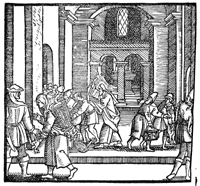An Antithesis

And Jesus entered the temple and drove out all who sold and bought in the temple, and he overturned the tables of the money-changers and the seats of those who sold pigeons. He said to them, "It is written, 'My house shall be called a house of prayer,' but you make it a den of robbers."
And the blind and the lame came to him in the temple, and he healed them.
St. Matthew 21.12-14
I was reading through this chapter of St. Matthew's Gospel the other day, and this short passage seemed to stand out to me; I had never noticed the verse that follows right after the account of the cleansing of the Temple. It is, I suppose, not terribly exceptional for the course of the whole narrative; Jesus is frequently recorded healing the blind and lame. Yet I could not help noticing the antithesis presented by this short passage: the Temple is filled with the money-changers and merchants, changing the Temple from a place of prayer and love of God to the making of money- for more-or-less religious purposes, nicely absorbed into a structure of wealth-accumulation. Jesus calls them 'robbers'; He was often insensitive, we would say. After all, weren't these men just fulfilling the Israelite Dream? They had to make a living too, surely? He calls them robbers, and not only that, but drives them out of the Temple, calling their wedding of faith and commerce (in which the commerce is more in view it would seem) fatally incompatible.
That part we all remember and know, of course, but notice also what happens immediately afterwards: the sacred precint, cleansed of the robbers, is filled with the sick. The blind and lame, the people who probably weren't going to be filling the coffers of the Merchants of Faith, come to Jesus, come into the Temple. They are healed there. Christ has turned the merchants and money-changers out and brought the people at the edge of society in. The respectable- albiet ethically shady- tradesmen are gone, replaced by the dirty, the sick, the 'useless.' But the Temple is being turned back to its true purpose: a place of prayer, by people who are dirty, sick, and useless, the downcast, the poor.
I cannot but think of the image of the Church as the 'hospital of souls'; not another means of transaction and capital-building, or of securing one's place in Society, but the place for the blind and lame to be healed. And we ourselves are, as St. Maximus Confessor noted, images of the Church; we too must seek to become places of refuge and healing, for ourselves and for those around us.












0 Comments:
Post a Comment
<< Home